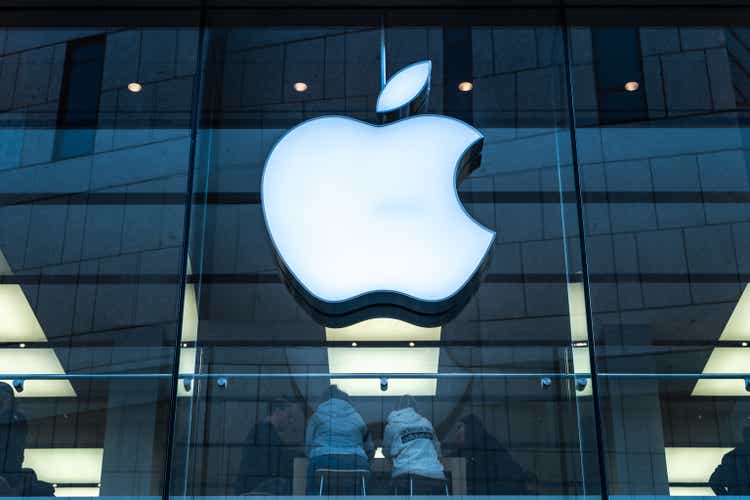
Wirestock
The EU’s potential plan to warn Apple (NASDAQ:AAPL) to open up the company’s iPhone operating system to rival technologies is not expected to have an immediate impact, and the company won’t conform without putting up a fight, according Seeking Alpha analysts.
Reportedly, under the region’s Digital Markets Act, the European Commission is set to announce that Apple must adhere to the new rules on making operating systems fully functional with other technologies.
“The Digital Market Act, or DMA, is a major headache for Apple’s control of their operating system,” said Seeking Alpha Investing Group Leader Stone Fox Capital. “The company won’t see any immediate impact, but their products could ultimately be less competitive or lose out on revenues.”
Stone Fox Capital (also known as Mark Holder) added that the App Store is the major driver of high margin growth, and the EU aims to force Apple to quit steering users to their apps and store.
Meanwhile, Seeking Alpha Investing Group Leader Livy Investment Research said that EU is a key operating region for Apple, and will likely conform to requirements to open up iOS if called upon.
“But this is unlikely to materialize in the near future – it’s a substantial change and Apple won’t just conform without putting up a fight and ensuring its interests are optimized and protected,” Livy Investment commented.
The analyst added that it is similar to Apple’s earlier inclusion of third-party app stores on iOS. The additional Core Technology Fee and other processing fees charged have, to some extent, disincentivized developers from venturing outside the App Store, while also safeguarding related service revenue growth for Apple.
“Apple will likely apply a similar fee framework (e.g. licensing fee) if/when the EU demands the opening up of iOS to rivals,” Livy Investment noted.
The U.S. tech giant and the EU regulators have long been in a tussle over several policies the company’s services come with.
Last month, Apple updated its App Store fee structure for developers in the EU to comply with rules under the DMA. The changes centered around how app developers using Apple’s App Store in the EU link to the web to show users alternative payment methods. In June, the European Commission had informed Apple of its preliminary view that App Store rules breach the DMA, as they prevent app developers from steering consumers to alternative channels for offers and content.
In August, the Cupertino, Calif.-based company pledged to make additional changes on how EU users interact with the browser choice screen, default apps and app deletion on iOS and iPadOS to comply with the DMA.
“Although opening up iOS to rivals might risk some smartphone revenue share dilution, it’s unlikely to materially impact Apple’s long-term operations and fundamental outlook,” said Livy Investment.
The analyst noted that the iPhone installed base has a 98% customer satisfaction rating, with most loyal to the broader Apple ecosystem of products and services. Dedicated iPhone users are unlikely to jump ship to another non-Apple iOS device unless they are highly price sensitive.
This results in two implications: Firstly, a non-Apple iOS device needs to be a budget product, which may not be economically rational for smartphone makers depending on the licensing fee charged; this could disincentivize adoption, according to Livy Investment.
Secondly, a cheaper non-Apple iOS devices would compete mainly against iPhone SE volumes, and this product is not a needle driver for Apple, the analyst added.
“In the event iOS is opened to rivals, Apple will likely see a transition of lower margin iPhone SE revenues to the form of higher margin services revenue realized through iOS licensing fees, hence the net impact on its earnings outlook could be immaterial,” Livy Investment stated.
The DMA is a legislation that establishes a set of objective criteria to qualify a large online platform as a “gatekeeper” and ensure that they behave fairly online and leave room for contestability.
In September 2023, European Commission designated for the first time six gatekeepers — Alphabet (GOOG) (GOOGL), Amazon (AMZN), Apple, Meta Platforms (META), Microsoft (MSFT) and Chinese tech giant ByteDance (BDNCE) — under the DMA. Certain products provided by these companies come under the DMA and the EU’s Digital Services Act, or DSA — which regulates online intermediaries and platforms that millions of Europeans use every day. The DSA protects consumers and their rights online.
